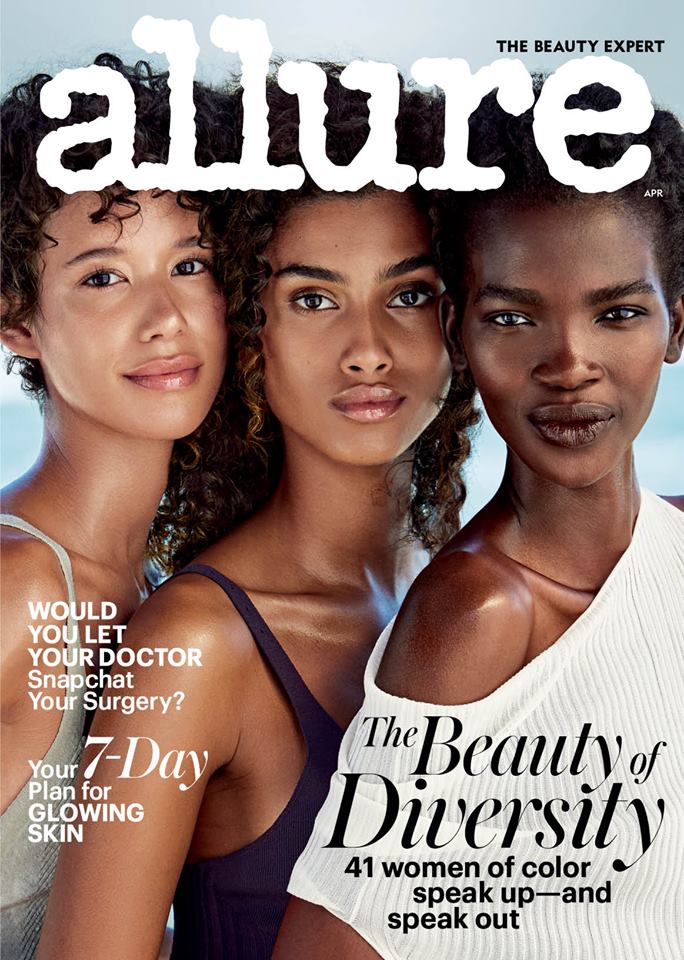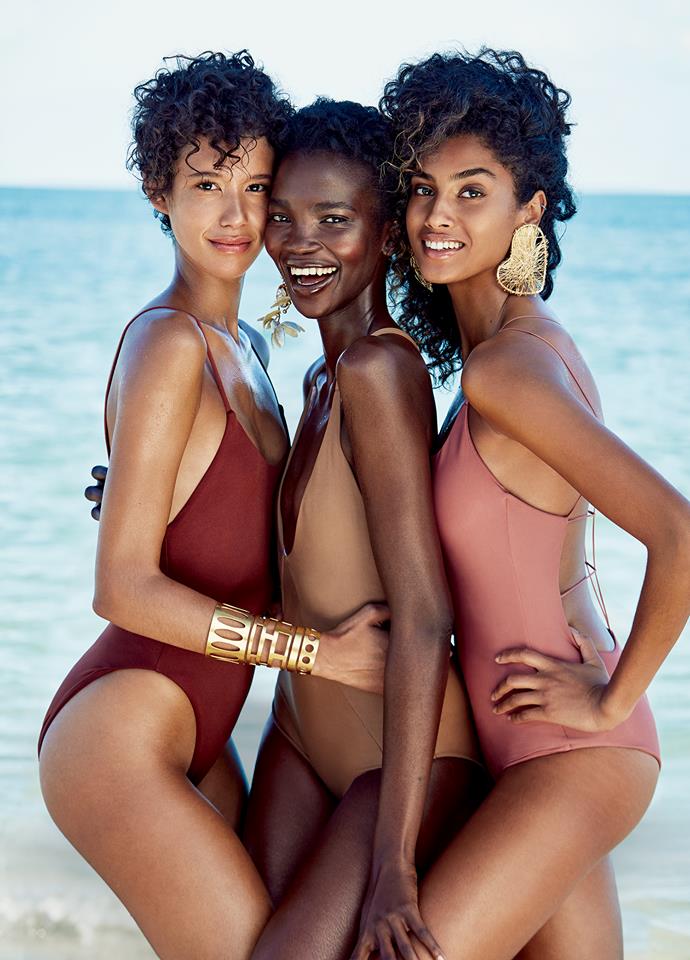On the heels of Elle magazine’s deep dive into the disappointing and discriminatory experiences of Black models in the fashion industry, Allure magazine has dedicated their April 2017 cover story to the topic of skin. Not 10 ways to make it brighter, smoother, or more beautiful, as you might expect from the beauty magazine, but how our skin — specifically our skin tone — defines how we are seen by others and how we see ourselves.
Forty-one women of color were asked to tell the story of their lives through their skin. Women like the “Beauty of Diversity” cover models Dilone, Imaan Hammam and Aamito; actresses Zazie Beetz, Meghan Markle, Dasha Polanco, Tessa Thompson, Susan Kelechi Watson, and Samira Wiley; and a host of vloggers, dermatologists, journalists, makeup artists, and more. Here are a few of those stories.
Padma Lakshmi, author, actress, and executive producer, Top Chef
“My skin is a map of my life. Before high school, I lived in a white suburb of Los Angeles where there were so few Indians that they didn’t even know the ‘correct’ slurs. They called me the N-word or ‘Blackie.’ For a long time I hated my skin color. Even in India, there’s a complicated history. My grandmother discouraged us from going in the sun; she didn’t want us to be dark. We were only allowed to play outside after 4:30. There was a cosmetics line called Fair & Lovely — that says it all. [And] when I started to work as a model, people would on occasion say things to me like ‘You’re so pretty for being an Indian.’”
Zazie Beetz, actress, Atlanta and Slice
“My father is German; my mother is African-American. Growing up, I visited my grandparents in Berlin a lot. I would not see any other person of color for three weeks. People would stare. They would say things like ‘Oh, you look like chocolate — I want to eat you up!’ I’ve been to gatherings where people would say, ‘She has so much race in her’ or would use the word ‘n*****’ — or the German term ‘neger.’ And I would be like, Who are you talking to? I feel German, I speak German, [but] I don’t look German. In the United States, if you’re African-American, it can be assumed that your family has been here for generations. In Europe, colonialism is much more alive and it’s assumed you’re from Nigeria or Senegal. I would have these conversations like ‘Where is your mother from?’ ‘Brooklyn.’ ‘No, but where is she from?’ I would respond, ‘We don’t know,’ since we can’t trace our roots beyond North Carolina. Slavery has erased our ability to find our origins. We have been here as long as some of the first immigrants.”
Habiba Nosheen, journalist, The Fifth Estate
“I was born in Pakistan, and when my mother told me we were moving to Canada, I asked her, ‘What do the people there look like?’ And she said, ‘They look like the show you watch, Full House.’ So I assumed that when I would arrive in Canada, I would turn into a white blonde. And I was horrified when I got to the airport and I was still brown. I just couldn’t understand that different colors coexist. I think I’ve come a long way from that nine-year-old girl who wanted to trade in her brown skin for white. I love what my brown skin looks like and what it represents. And there are many times I’m fully unaware of my skin. The perfect example is I’m talking to somebody, and they would look at me and say, ‘So how do they do that in India?’ I say, ‘I’m not sure. I’m from Pakistan. But I can Google it for you and find out.’ That always creates such an awkward moment, but I think awkward moments are not bad; they push us to confront our prejudices. Uncomfortable as it is to hear ‘Oh, you speak English really good for a brown lady,’ it really tells me that people have these ideas but there’s no healthy space to ask these things. We lack basic vocab about understanding our differences. Now I love walking into a room and I don’t look like everyone else. I hope that love for my skin I’ve developed as an adult I can pass on to my kids.”
Lilly Singh, digital creator, Superwoman, and author, How to Be a Bawse: A Guide to Conquering Life (Random House)
“The last time someone made me feel bad about my skin would be every single comment I get about my face makeup not matching my neck. It’s something I get on YouTube. Maybe if more foundation matched my skin tone, haters would slow their roll.”
Aja Naomi King, actress, How to Get Away With Murder
“I was afraid of the darkness of my skin. I believed I had to be celebrated for my intelligence and my sense of humor. Those could be the beautiful things about me since my skin couldn’t. I remember in junior high having a beach day with my family and going to school the next day. Someone in my class exclaimed shock at my appearance. She didn’t know black people could tan. The look on her face stuck with me. For years, I wanted to avoid direct sunlight. The comments you hear as a child stick with you. [I was] afraid of photos in dark rooms because you know no one will be able to see you in the picture and [people] will make fun of you. [I feared] walking into a room that has a black wall and hearing someone remark about how you’ve disappeared. You try to avoid these situations so you’re not in a position to act like you don’t care or [you] make fun of the darkness of your skin before someone else does so that maybe it will sting less. It has been a process of self-love to embrace the beauty of every single drop that makes up the richness that is my beautiful brown skin. If you learn anything in life, learn to love yourself. There is no amount of makeup or skin-care products that will make you love yourself.”
Khoudia Diop, model and diversity and anti-bullying advocate
“My skin is dark and glows. It almost seems blue, and it’s supersoft. I realized my color is beautiful when I got out of my country [Senegal]. I was in Italy on vacation, and I saw my reflection in a mirror. I saw how unique my skin was and why people stop me on the street to ask about it. I started falling in love with it.”
Sasheer Zamata, comedian and Saturday Night Live cast member
“When I was younger, a lot of older black people would tell me, ‘Don’t go outside for too long because you don’t want to get darker.’ When I got older, I realized it was passed down colorism. What the black community has experienced has been absorbed. We kind of police each other. My mom grew up in Arkansas during the civil rights movement. She’s one of seven kids, and she’s one of the darker-skinned kids in her family. She said that her mom would treat the lighter-skinned kids better. My grandma absorbed whatever messages she was getting in the world: ‘If you are light as a paper bag or if you have straighter hair, you will get treated better.’ Thankfully, my mom didn’t pass any of that energy to me. [Being on Saturday Night Live,] I’ve gotten some really nice comments from other black people who say, ‘It’s so nice to see a woman of color who looks like me on TV.’ I am darker than a lot of women who are on TV, and my hair is natural. To a lot of people, it’s important to see me on TV, and I’m so happy to be there and do that.”
Balanda Atis, manager, L’Oréal’s Global Women of Color Lab and U.S. Liquid Face Lab
“Up until several years ago, the primary target for most cosmetics companies was the Caucasian consumer. But the population has changed quite a bit, and businesses have had to come up with shades for people of medium to dark skin. I was given the opportunity to measure skin tones. We noticed that there was an area of violet in darker skin tones that had not been understood in the past. We ended up incorporating ultramarine blue, which takes you deeper but not necessarily blacker. I like to say that there’s a new skin tone born every day.”
DeWanda Wise, actress, Shots Fired and Underground
“Being a chocolate-black girl, there’s always this conversation about what it means to live in a duality. I went to all-white schools. My differences were always really kind of celebrated. I didn’t grow up teased — I was homecoming queen. I didn’t hit the glass ceiling until I was starting to audition. And even then, we all have our privileges — I have a pretty face. I still found myself being in the same conversations as women who look nothing like me. What I find inspiring now is differences are being celebrated. There’s this earnest exploration of what it means to be beautiful. The queen mother of chocolate girls is Viola [Davis]. In Hollywood, everyone has a type. If you’re blonde in your twenties, they expect you to be ditzy. And Viola was like, ‘OK, this is the space that I’m placed in, but it’s my job to subvert your expectations.’ Between her and Kerry [Washington] opening the doors…I wouldn’t be on She’s Gotta Have It now if it weren’t for those women.”
Veronica Webb, model, founder of webbonthefly.com, and first woman of color to have a major cosmetics contract (with Revlon in 1990)
“Every time there’s a big idea or a different idea, there’s going to be controversy; there are going to be detractors. There were people who were offended that a black person would have a Revlon contract. Some of them even went into threats. Then there were other detractors who felt I wasn’t black enough. So too black, not black enough. The point is that the world is also full of smart, kind people, and that’s why things move forward.”
Read more stories here.











